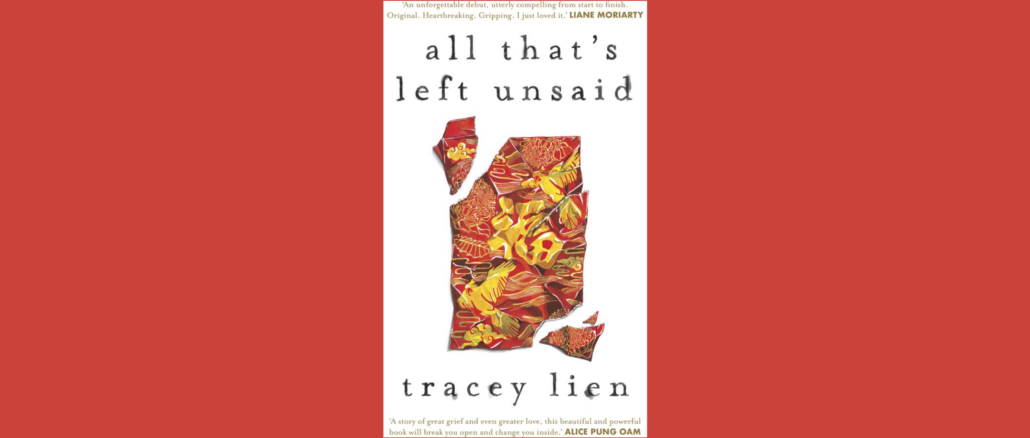
Australia is currently seen by many across the globe as a shining beacon of opportunity for all, as having equality among it’s citizens, as being a land of great wealth, having expansive beauty and being a radiantly fair and just society with a reliable legal system. Upon closer inspection, however, delving into the sometimes murky minutiae of Australian life, one sees that the seemingly utopic Australia also harbours a dark, frequently hidden, underbelly. Australia, it seems, is ostensibly a fair and just society where there is equality and harmony – it’s just that it’s more fair and more just for some than others, and more equal for some than others.
These seismic and sobering truths are poignantly and devastatingly illuminated in Vietnamese Australian (now living in New York) author Tracey Lien’s stellar debut novel, “All That’s Left Unsaid”.
Taking place in the vibrant yet sullied south-west Sydney suburb of Cabramatta in summer, at the end of 1996, this novel initially takes us to the funeral and then wake of seventeen year old Cabramatta high school student, Denny Tran. At the wake, in the Tran family’s townhouse, Denny’s father (Hanh, a bank teller), mother (Yen, a worker in a fabric shop) and twenty-two year old sister Ky, a newspaper journalist living in Melbourne, are in a foggy haze of grief, while Ky attempts valiantly to engage with Denny’s high school teachers who are present (the only people in attendance who are not related to the Trans).
The Tran family are Vietnamese Australians who have come to Australia as refugees (Ky was toilet trained in a Malaysian refugee camp). Denny was the only family member born in Australia, a fact that caused the Tran parents to feel “they had a fresh start”, Ky thinks. Ky is additionally of the opinion that “Denny represented an untainted opportunity” for her parents.
Hanh and Yen have brought all of their beliefs (mainly Buddhist) and superstitions to Australia with them. Yet, as Ky attempts to engage with her mother at the wake, she finds that her mother “refused to acknowledge that Denny had suffered a bad death, the worst kind, a nightmare that stole her words and silenced her family”.
Perplexingly and devastatingly, the three Tran family members are “in the dark” over much of Denny’s death. “The facts, which Ky had gotten secondhand from her parents, were patchy”. It seems that Denny had gone to Lucky 8, a seafood restaurant in Cabramatta, with Eddie Ho, his best friend, after they had attended their year-twelve formal. Ky had talked her parents into letting Denny go to Lucky 8, a fact she now feels overwhelmingly guilty for. What transpired at Lucky 8, Ky’s parents won’t tell her, just insisting that it was “bad luck”. Hanh and Yen speak very little English, and Ky is their interpreter and knowledgeable divulger of the way Australian society and the legal system in this strange country, to Hanh and Yen, actually work. Hanh and Yen have not asked the questions to the police about Denny’s death that is normally the case, and have even declined an autopsy, not seeing that it would achieve anything.
Ky, in light of her parents’ reticence to seek answers about Denny’s death, takes herself to the intimidating and distinctly unfriendly Cabramatta Police Station. Talking to a Constable Edwards at the station, Ky finds that cruel and harsh insinuations are being made about Denny, Constable Edwards hinting that Denny may have been into drugs (Cabramatta at this time was known as the “heroin capital of Australia”). Ky indignantly and forthrightly informs Constable Edwards, “He (Denny) came first in everything. He was the most hardworking, studious, nerdy (student)”.
Ky’s request of a police report is declined, and Ky finds that “she’d never felt more invisible” as she does at the police station. Ultimately, Constable Edwards illegally agrees to hand over to Ky the notes he made on the case. These ‘notes’ contain the names, phone numbers and addresses of the witnesses at Lucky 8 the night that Denny was murdered, witnesses who have so far have refused to ‘talk’.
Ky finds that some seventeen people (both diners and workers) were at Lucky 8 the night Denny died, and that “Only ten stuck around until the police told them they could leave”. Ky tracks down almost all of these ten ‘witnesses’, people who have refused thus far to share with the police what they saw or heard. These witnesses (or are they?) of Denny’s murder include the Woo family (Guang, Hong and Lulu), Flora Hynh (a singer), Jimmy Carter (the dishwasher), Thu Ly (the cook) and Phat Luong (the waiter). Also at Lucky 8 were Eddie Ho and Kevin Truong (Denny’s friends and fellow diners) and Sharon Faulkner (Eddie’s geography teacher who was out to dinner with Denny, Eddie and Kevin).
Alarmingly and demoralisingly, Ky finds the witnesses (those she can track down) don’t want to talk to her. Guang Woo, who works at the Comalco aluminium factory, insists he and his family faced the wall during a commotion. Flora is hesitantly evasive and and lies to Ky (reasons for which become apparent as the novel progresses). Sharon is also reluctant to tell the truth to Ky, insisting that she, Eddie and Kevin were in the toilets during the commotion. Sharon, despite holding a venerated job in society, is not the pillar of respectability she appears. We are told “she (Sharon) knew she couldn’t tell the whole truth (to Ky) – she’d nixed that possibility when she’d lied to the police”.
As well as being a spine-tingling and heady mystery, “All That’s Left Unsaid” is a starkly searing and far-reachingly cautionary tale of the sometimes disappointing and excluding migrant experience in Australia, as well as referencing family love and dynamics. In a country where we like to think it doesn’t matter where you come from, what colour your skin is or what your last name is, Tracey has shone a much-needed light onto the at-times isolating and even hostile experience of migrants and their families in Australia. As Ky thinks heartbreakingly, “Hadn’t she hidden the bullying, the name-calling, the cruel acts of strangers, the times she’d been told to go back to where she came from……the way she was asked why she couldn’t take a joke…….comments about what Asian women were and weren’t, what Asian women could or couldn’t be…”. Indeed, “she felt…….as their (her parents’) bridge to Australia, she had a responsibility to protect them from the country’s own horrors”. One has the unrelenting impression that had Denny’s death occurred on Sydney’s North Shore to a white family, the police would be much more eager and motivated to pursue and solve the case.
Will Ky be able to get to the truth (no matter how confronting and devastating) about what really happened to Denny at Lucky 8 on a night of so much promise and, at least at one stage, unbridled joy? What possible reason could the Woos, Flora, Sharon Faulkner and even Eddie, the loyal best friend of Denny’s, have for lying to the police and later Ky? Who is Minnie, the owner of the ever-present voice in Ky’s head, and why is Minnie no longer in Ky’s life? Is Minnie a link to Denny’s case? Is Sharon, in some backroads kind of way, a link to Denny’s case?
With themes of racism, poverty, the Vietnamese migrant experience in Australia, parental expectations of children at school and in life, and errant and lacking law enforcement, Tracey has unflinchingly and beautifully raised the bar for writers around the globe. Despite showing a side of Australia we’d prefer not to ‘see’, Tracey has left us with the staunch belief that all is not lost in the hope for Australia’s redemption. We must as a country do better; we can do better.
Bravo Tracey for gifting to the world a gem of a novel that is full of intelligence, insight, perspective and wisdom. I loved this book, and can’t wait to see what Tracey writes next.


Leave a Reply